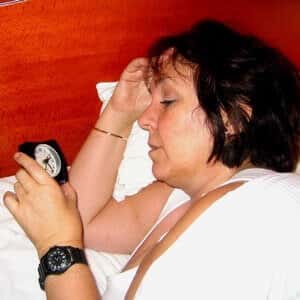
Sleeping pills are big business. That is especially true for over-the-counter drugs. Millions of people take “PM” pain relievers regularly because they fear they may not fall asleep easily. Diphenhydramine is the most common ingredient. But another hard-to-pronounce sedating antihistamine can also be found in OTC sleeping pills. It is doxylamine. This reader describes a confusing situation with this sleeping pill. Her health professionals did not agree about the safety of doxylamine.
A Sleeping Pill and Memory Problems:
Q. You have written that diphenhydramine in “PM” pain medications can be risky for older people. I take a medication that contains doxylamine.
No pharmacist has ever told me that this might be a problem. However, a psychologist specializing in memory problems told me that I would be better off with a prescription sleeping pill. What do you think?
A. Both doxylamine and diphenhydramine are sedating antihistamines. They have anticholinergic effects that can cause problems for older people. Acetylcholine (ACh) is a brain neurochemical that is essential for memory and many other neurological functions. Anticholinergic drugs can interfere with the action of ACh.
Although many older people use such products to help them sleep, both drugs are considered potentially inappropriate for the elderly (International Journal of Clinical Pharmacy, Aug. 2017). When senior citizens purchase an OTC sleeping pill, there is no warning about age or memory problems.
Here is a message from Linda about her sleeping pill and brain fog:
“I have been taking doxylamine succinate for years. It helps me sleep well. I am 74 years old and am experiencing ‘brain fog’ more recently. I was assuming it was a part of my aging process.
“After listening to your radio show on this issue I am beginning to wonder if the sleep-aid is actually causing the problem. If it is, can the damage be reversed? I plan to stop taking the pills immediately. I have tried natural sleep aids but they don’t seem to work for me. I am very worried about this.”
Chandra offers this comment about doxylamine as a sleeping pill:
“I have long lectured myself about taking the common over-the-counter antihistamine doxylamine succinate for sleep. I just saw the physician’s assistant on Monday to extend my CPAP machine prescription and raised the issue. ‘Don’t worry about it,’ he said.
“Well, I’m going to worry about it! Time to get off, once and for all. What is a puzzle to me is that I have researched negative side effects before and haven’t found the anticholinergic connection. Now, a Google search brings that up immediately. I repeat (and at least I know I’m repeating): Thanks for this alert! It’s just what I needed to clean up my act.”
Is Zolpidem a Safe Sleeping Pill Alternative?
Unfortunately, some prescription sleeping pills such as zolpidem may affect memory and balance and put people at risk for falls and fractures (Expert Review of Clinical Pharmacology, Jan. 2014). As a result, they may not be a great substitute for doxylamine.
You can learn more about medications that may be dangerous for senior citizens from our Guide to Drugs and Older People. Anyone who would like a copy, please send $3 in check or money order with a long (no. 10) stamped self-addressed envelope:
- Graedons’ People’s Pharmacy, No. O-85
- P. O. Box 52027
- Durham, NC 27717-2027.
It can also be downloaded from this website.
Here is a list of drugs with anticholinergic activity. You can also listen to the free podcast of our show on this topic at this link.
Share your own story about sleeping pills in the comment section below.

